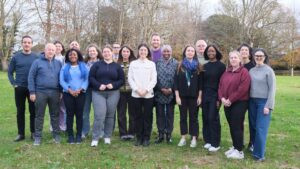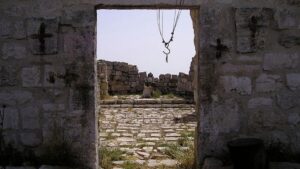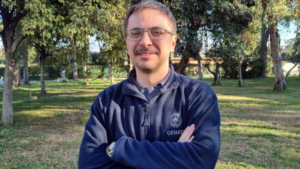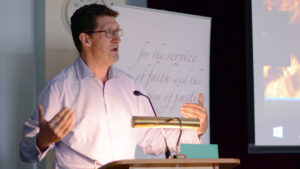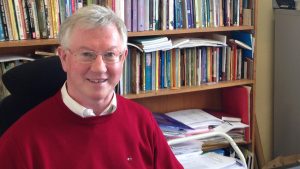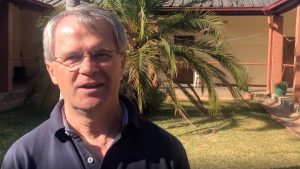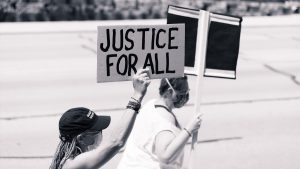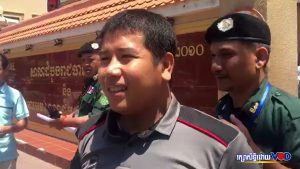Bishop speaks of hell on earth in his diocese
Bishop Tesfaselassie Medhin from Adigrat diocese in Tigray Ethiopia, is a friend of John Guiney SJ, Director of Irish Jesuits International (IJI), who worked with him for years when in the Jesuit Refugee Service together. The Bishop is also a former student of philosophy from the Milltown Park Institute of Philosophy and Theology in Dublin. In the interview above, he tells Pat Coyle, of Irish Jesuit Communications, that whilst studying in Milltown, he could never have envisaged the horrors he would have to face from 2020 to 2022 after Tigray was invaded by its own Ethiopian government forces, aided by foreign mercenaries from Somalia and from Eritrea, the latter a country that had been defeated in a previous war with Ethiopia. Tigray is in northern Ethiopia and is bordered by Eritrea and Sudan.
Over one million people were murdered and almost three million people displaced during the ensuing war. The invading forces committed horrific human rights violations, including torture and sexual assaults. One quarter of a million women and children were raped and sexually assaulted. ““The people in Tigray have experienced hell: there were gang rapes and murders in front of families – even children and old women were among the victims. Over one million people were killed. Torture and massacres took place; relief supplies were blocked.”
The Bishop notes in the interview above that all this went on without the world knowing anything about it. The government cut off all means of communication in the Tigray region. Foreign journalists were expelled and the whole region was blocked and put under siege. There was no internet, and the telephones did not work. The bishop did not know was was happening in many parts of his diocese, and people were terrified to leave their homes as armed militia roamed the streets. His whole diocese was afflicted by the war and even now some more remote areas are still inaccessible and under occupation though the ‘genocidal acts’ officially ended in November 2022. And to this day he has still not seen some of the priests of the diocese since the war began.
In his interview Bishop Tesfa says he and his fellow priests and religious are trying to help and accompany the suffering communities in Tigray by being a sign of hope as Church. He says that despite the utter awfulness of what he witnessed and what his people suffered he will never lose hope because those who lose hope are the “walking dead”. The war was not a religious war and during the two years inter-faith communities and religious organisations persistently called for peace. His faith in Christ, particularly in his crucifixion and resurrection, is what sustained him, he says. Though he has had to work had at holding on to the Christian belief that we are all made in the image and likeness of God, in the face of the henious acts, particularly of gender violence, that soldiers and mercenaries inflicted on their fellow human beings.
Bishop Tesfa says that everyone in Tigray has been traumatised by what has happened. Women violated by rape are ashamed and terrified to return home. Some are suicidal. Children have witnessed unspeakable acts of violence, people have been maimed or tortured. “It is in the midst of all this that the life and death of Christ has its full meaning,” he says. The diocese has set up trauma healing centres but the bishop tells Pat Coyle that unless there is some type of truth commission, through which the full extent of the horror that was inflicted on his people is acknowledged fully and honestly, there will be no lasting healing.
He is also concerned about the children of Tigray, many of whom have still not been able to return to school. Hundreds of school buildings were destroyed during the war or have been unable to reopen after it. Hundreds of thousands of children are without education. Families are without basic necessities, food, medicines, pots, utensils. The tragedy is compounded by the recent actions of Donald Trump, cutting of millions of dollars of USAID, some of which would have been previously channeled into life-saving programmes in Tigray.
The Bishop was in Ireland this June to address CIDSE – the International Cooperation for Development Solidarity group. CIDSE is an international alliance of seveteen Catholic development agencies from North America and Europe, fighting poverty and inequality by working together for global justice. Given the scale of destruction visited on his diocese, and the fact that peace-building and trauma healing is a slow process, Bishop Tesfa says he is grateful for any support he receives. John Guiney SJ, says that Irish Jesuits International will continue to assist the bishop and the suffering people of Tigray.
Whilst in Dublin, the bishop was delighted to meet with two of his former lecturers in Milltown Park – Bill Mathews SJ, and (much to his surprise and delight), Pat Coyle, who was interviewing him for Irish Jesuit News and the Jesuit website »




